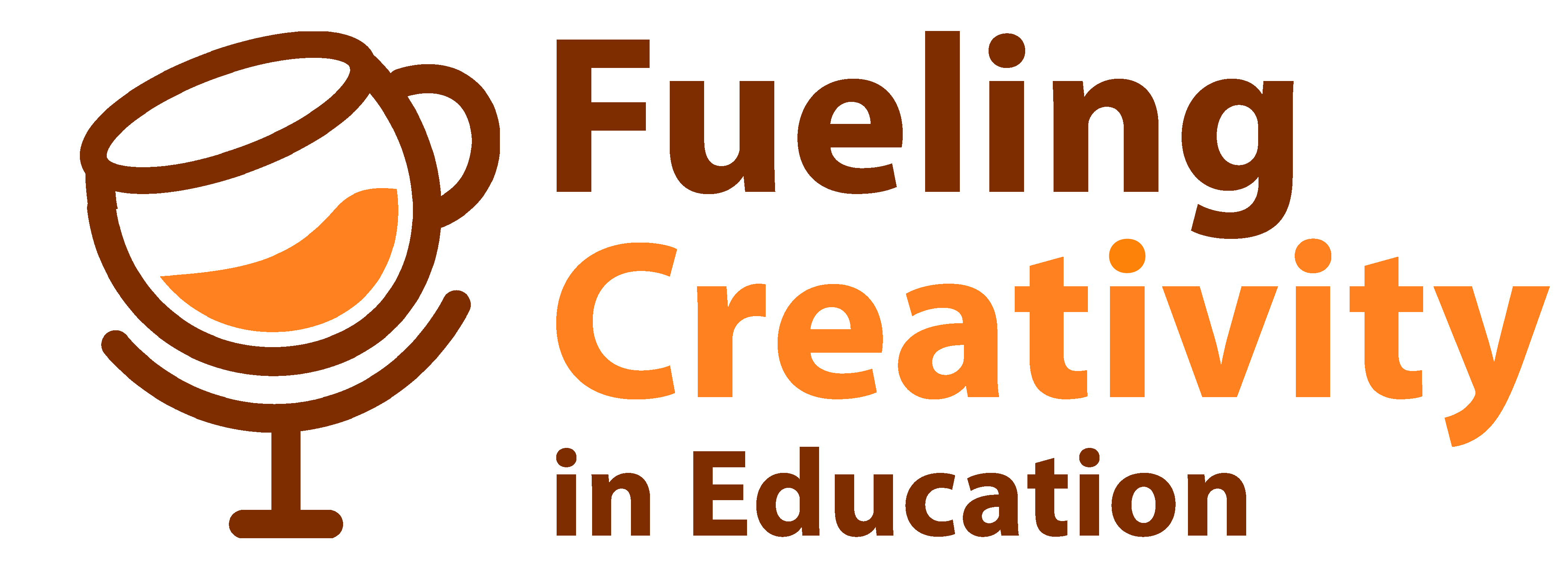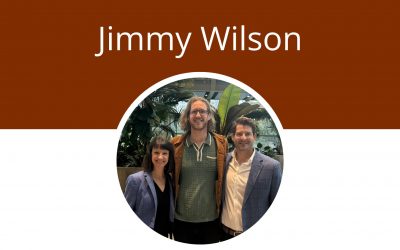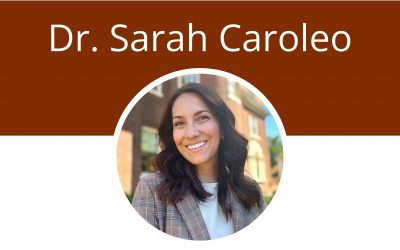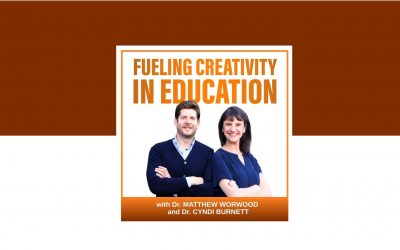SEASON 7
A Thanksgiving Special: What colleague or innovation are you thankful for?
“ I’m grateful for the spoon. I think it’s one of the best inventions ever in the world. And I think that in education, the spoon does a lot for your students. It teaches them to think outside of the box. I think it’s a really great tool when you’re showing it to students and asking them, what can you use the spoon for besides eating? ”
– Mark Frank
Episode Transcription
A Thanksgiving Special: What colleague or innovation are you thankful for?
Mark Frank:
I’m grateful for the spoon. I think it’s one of the best inventions ever in the world. And I think that in education, the spoon does a lot for your students. It teaches them to think outside of the box. I think it’s a really great tool when you’re showing it to students and asking them, what can you use the spoon for besides eating?
Matthew Worwood:
Hello, everyone. My name is Dr. Matthew Werwood.
Cyndi Burnett:
And my name is Dr. Cindy Burnett.
Matthew Worwood:
This is the fueling Creativity in Education podcast.
Cyndi Burnett:
On this podcast, we’ll be talking about various creativity topics and how they relate to the fields of education.
Matthew Worwood:
We’ll be talking with scholars, educators, and resident experts about their work, challenges they face, and exploring new perspectives of creativity.
Cyndi Burnett:
All with a goal to help fuel a more rich and informed discussion that provides teachers, administrators, and emerging scholars with the information they need to infuse creativity into teaching and learning.
Matthew Worwood:
So let’s begin. Welcome to our very special Thanksgiving and gratitude episode of 2023. And that’s because we are recording this episode for the Thanksgiving Week in the United States of America. And Cindy, I don’t know about you, but I feel we’ve got so much to be grateful for when it comes to the podcast this year.
Cyndi Burnett:
Yes, Matt, I mean, I think we are very grateful that we have some amazing listeners out there, including two special listeners who are our winners from the summer Listen and Learn series. Today we want to welcome to our show on this very special Thanksgiving episode, gifted and education specialists Laura Winkler and Mark Frank, who is a STEM educator. And we will give you their full bios next week for a full episode. But we did want to invite them here today to say thank you to them and to all of our listeners out there for helping us reach 50,000 downloads and to talk a little bit about something that we’re grateful for in the classroom. So, Mark and Laura, welcome to the show. Thank you.
Matthew Worwood:
So welcome to the show, Mark and Laura. And a big thank you for our Thanksgiving week. So what we’re going to do is we’re going to identify a classroom innovation or a professional colleague that we want to give thanks to for this year. And we’re going to elaborate a little bit about why we’ve selected that innovation or professional colleague. So, Laura, let’s start with you.
Laura Winkler:
Thank you. I appreciate being here, and I’m grateful for this experience also to see this and be a part of this podcast because I listen to it every week. I absolutely am so grateful for my two job alike colleagues who we each teach in a different elementary school. But I can be a lot. I am quite intense. I have lots of big and crazy ideas and I’m all over the place and I’m big picture person. And so Meredith Frelic and Susan Carter are two colleagues that really just not only ground me, but also, I think, appreciate me and kind of find a way to kind of rein that in. And we have this way of being able to kind of build upon each other’s strengths and have this synergy that just makes me so grateful that I get to work with, not only work with them, but know them as amazing humans.
Cyndi Burnett:
What a lovely tribute. And did you have a classroom innovation you’d also like to share?
Laura Winkler:
Yeah, maybe this really isn’t an innovation. I don’t know. I was thinking, what is something different that I’ve done this year? Know, I’m grateful that I’ve instilled as part of my practice, and it’s a little thing, and it has to do with Chad GPT, who my students and I lovingly called Chad. And there’s a funny backstory to that, but I really didn’t know how to kind of embrace and even understand and utilize it, and I still don’t fully and probably never will fully, but one of the things that when it first came know and we talked about it and we were using it to I would know different questions and that, well, I wonder what Chad would say. And so I decided to build in a routine, kind of, I don’t know, routine is not the right word, but I have in my room, I ordered this. It’s just a clay plant pot that looks, it’s probably called Harry Potter or something because it looks like the Harry Potter glasses and it’s a little clay pot, but it has an opening. And where’s the name tag that says Ask Chad? And so they can submit different wonderings they have. And then whenever we have a few minutes here or there, we’ll ask.
Laura Winkler:
And it’s the cutest little random question sometimes. But what I love about that, there are three things that I was like, well, why is that? Who cares that I’m doing that? What is that one? I feel like it introduces it as this is going to be a part of their lives forevermore, this generative AI. And so they’re hearing lots of mixed messages about it in education. Like, it’s a bad thing, it’s a good thing, there’s just a lot of unknowns about it. And so just to bring it to the forefront, like, here’s this thing that exists, and here’s a way it can be used. I also love because it honors their curious nature. No one person knows all the answers, but if there’s this resource that can access all this information, why not use it when you’re trying to find out an answer to something? And then the third thing I unexpected. I didn’t think of using it in this way, but it has really helped with kind of sharpening their questioning skills because, as you know, if you’ve used it, the way in which you ask the question completely impacts the answer you’ll get.
Laura Winkler:
And so they’ve learned how to kind of ask better questions of it. And sometimes it’s in the moment as I’m asking the question, and they get, they’re like, well, no, that’s not really what I meant. And so we just kind of keep going and keep going to get to what they meant. So I would say that’s been like a new thing, an innovative. I don’t know if innovative. It’s a new thing I’ve tried in the classroom this year that I feel like the kids have really. It’s had a lot of potential for learning.
Matthew Worwood:
Well, it fully meets the definition of innovation. The episode is all about gratitude and being thankful. But wow, that was really super duper jam packed with so many really fun follow ups, which perhaps we’ll do in our next shoW. So thanks so much for sharing. Mark, what about you? A professional colleague and or innovation?
Mark Frank:
I’m really grateful for all of my professional colleagues. I know that sounds cliche, but my principal, my administrators, my coworkers, my principal gives me the ability to help out teachers throughout the school. I’m a mentor. So it’s just a great opportunity to work in my school. And also, I’m grateful for being in an administration program where I’m able to meet all these great professionals and learn a lot from them and discuss the challenges of school today with them and solve issues as they come across. So I’m grateful for that.
Cyndi Burnett:
I love hearing that, Mark, that you have so much appreciation for your administration, your fellow teachers, because I think that’s not the case in all schools, unfortunately. So to have that aspect and to be in an administration program where you can continue to not only be a great educator, but thinking about your future and becoming a leader in another school and taking what you’ve learned from your current leadership and putting that toward your future leadership is just so inspiring and hopeful. So thank you for sharing that.
Mark Frank:
Great. You’re welcome.
Matthew Worwood:
Do you want to bring more creative and critical thinking into your school? Look no further than our podcast sponsor.
Cyndi Burnett:
Curiosity to Create Curiosity to create is a nonprofit organization dedicated to engaging professional development for school districts and empowering educators through online courses and personal coaching.
Matthew Worwood:
And if you’re craving a community of creative educators who love new ideas, don’t miss out on their creative thinking network. Get access to monthly webinars, creative lesson plans, and a supportive community all focused on fostering creativity in the classroom.
Cyndi Burnett:
To learn more, check out curiositytocreate.org or check out the links in the show notes for this episode.
Matthew Worwood:
All right, Cindy, what about you though? What do you have in terms of you’re thankful for this over the last twelve months?
Cyndi Burnett:
Professionally, I would say the thing I’m most grateful for is working with Kitty Turbridge at curiosity to create and building a network of teachers who are passionate about bringing creativity into education. So it’s not a classroom innovation, but it’s a community innovation and it helps build this thing. I’ve been imagining in my head for years about teachers coming together to share ideas, to be living in an abundant mindset where we can access one another and be supportive of one another like Mark said, and be cheerleaders for one another. I don’t know how else to describe it, but really just to be there in a supportive listening space in a career and domain that is very, very challenging, especially right now. So I love the fact that we’re building this network and I just hope we can get more teachers engaged with us and to help them in any way that we can. So that is my gratitude. What about you, Matt?
Matthew Worwood:
Well, I kind of do want to now build and I’m going to try and avoid going on a tangent. But I think what’s great is that one of the themes in all of the things that we’ve been talking about over the last five to ten minutes has been the importance of colleagues and working in a community. And we certainly know from all of the research that’s conducted around professional development or professional growth, whatever phrase may be preferred in your setting, quite often it’s about those opportunities to interact with colleagues, to share ideas, to get feedback and any administrators listening. Certainly what I’ve observed, it’s something that you have to continue to make sure that you’re providing that time during the semester or the academic year. And then the other thing that I do want to just piggyback connected to that as well is that as we’re interacting with colleagues is just to recognize the diversity that we all bring. And I think, Laura, in your story, there’s something special when just feeling accepted that’s what I really got from your story, is feeling accepted. And I think that’s something that a lot of us kind of like, Grapple with. Whether or not we feel our ideas are accepted, whether aspects of our personality are accepted, these are all things that we continue to grapple with.
Matthew Worwood:
So if you’re in an environment where you feel accepted, that’s really special. And so kudos to your colleagues for that.
Mark Frank:
I have an innovation as well. Matt.
Matthew Worwood:
Oh, yes, please. Let’s hear your innovation, Matt. Sorry. Yeah.
Mark Frank:
I’m grateful for the spoon. I think it’s one of the best inventions ever in the world. And I think that in education, the spoon does a lot for your students. It teaches them to think outside of the box. I think it’s a really great tool. When you’re showing it to students and asking them, what can you use the spoon for besides eating? It gets them to really think. So. I’m grateful for that innovation that’s been around for a long time.
Matthew Worwood:
Listen, I’ll tell you what. When we’ve been talking about innovation, if you look at some of the innovation theories, sometimes it is about repurposing things, right? So you can take something like the spoon, which is obviously designed to solve a specific problem. It’s a problem we’re constantly using. We know in all of the kind of creative thinking challenges that we have, it’s typically about taking an existing object, repurposing it for an environment. But when you’ve identified a new function for that, that is innovation. And what you’re reminding me is all of the different challenges associated with the spoon, the spoon race, and all these different challenges that we do. So maybe actually, as we look to finding something we’ll be grateful for next year, maybe it’s a case of finding something that already exists inside our environment. All right, so I suppose it’s my turn.
Matthew Worwood:
And I know everyone’s on the same page, but I am grateful for my students. And the reason why I’m grateful for my students is because I’m always trying out different things in my classroom environment. Different strategies, different techniques. I never do the same thing. I’m always mixing up assignments, sometimes on the spot. I can’t help it. I must be a nightmare at times. And I think for the most part, right, like, sometimes I get bust up on the set surveys because I come across as slightly disorganized.
Matthew Worwood:
But for the most part, I really do think that the majority of students kind of accept me. And it’s in the way to what you were saying, Laura, I feel like the majority of students kind of, I think, recognize that I’m trying new things and trying to go about doing things in new ways, and I think there’s a level of appreciation for that. So I am grateful for my students, and I’m particularly loving the current students that I’m working with this semester. In terms of the innovation, there’s lots of different innovations, and if I’m honest with you, I’m probably cheating. This is an innovation from a couple of years ago, but I haven’t really had an opportunity to talk too much about it. But I was using Flip video, which was once Flipgrid, before the pandemic. Obviously, during the pandemic, it took on a whole new meaning because it allowed you to facilitate the conversations that you typically would have in a traditional classroom environment from a distance, asynchronously. I continue to teach a couple of my courses at a distance, and I still utilize that tool, and I think it’s a fantastic tool.
Matthew Worwood:
I look at all of the new additions that they’re bringing in, the way they’re trying to engage the community and through the platform. And I have to be honest, I feel like I’ve been able to have so much of a more robust conversation with individual students as a consequence of Flip, as opposed to when I’m in a class with 2030 students and we kind of like just put out a conversation topic, it’s quite hard to hear from everyone. But Flip allows you to have that one on one conversation asynchronously. So I continue to be incredibly grateful for Flip video. And no, they’re not sponsoring our podcast in any way.
Cyndi Burnett:
Well, I think that wraps up our special gratitude Thanksgiving episode. We would love for you to join in the conversation that’s going to be happening today on LinkedIn with Matt and I. So please log on to LinkedIn and join in the conversation of things you are grateful for in your classroom. And be sure to tag your fellow colleagues in this post so they can listen to the podcast as well.
Matthew Worwood:
My name is Dr. Cindy Burnett.
Cyndi Burnett:
My name is Dr. Matthew Warwood.
Matthew Worwood:
I just meant you got to say that. But we’re done. We’re going to leave it at that.
Cyndi Burnett:
This episode was produced by Matthew Warwood and Cindy Burnett. Our podcast sponsor is curiosity to create, and our editor is Sam Atkinson.
Welcome to a special Thanksgiving episode of the Fueling Creativity in Education Podcast! In this episode, we gather to express our gratitude and appreciation for the things that have fueled our creativity in the classroom. Join hosts Dr. Matthew Werwood and Dr. Cyndi Burnett as they welcome special guests Laura Winkler, a gifted and education specialist, and Mark Frank, a STEM educator. They share their stories of gratitude towards their colleagues and innovative practices that have made a difference in their classrooms. From utilizing AI technology to repurposing everyday objects like spoons, these educators show how thinking outside the box can fuel creativity in education. So grab a seat at the table and join us for a heartwarming and inspiring Thanksgiving episode filled with gratitude and creativity.
Episode Debrief
Collection Episodes
Practical Approaches to Unlocking Success Through Creativity in 2e Learners
Listen & Learn Practical Approaches to Unlocking Success Through Creativity in 2e Learners “we see so much ADHD or autism as deficit-based, but there was one study on business owners who are ADHD, and they showed that their passion was higher than average, their...
Training Educators for Positive Advanced Learning Outcomes: A Systematic Review
Listen & Learn Training Educators for Positive Advanced Learning Outcomes: A Systematic Review“Let's say it's on creativity, you teach the general topic. Maybe you give them some time to try to implement it on their own, but something they really endorse in that...
Developing Talent for Activism: Transformational Giftedness and Animal Justice
Listen & Learn Developing Talent for Activism: Transformational Giftedness and Animal Justice“Instead of telling somebody, here's what you need to believe about animals, She gives him information about animals, Here's what study show about how animals behave, and...
Podcast Sponsor

We are thrilled to partner with Curiosity 2 Create as our sponsor, a company that shares our commitment to fostering creativity in education. Curiosity 2 Create empowers educators through professional development and community support, helping them integrate interactive, creative thinking approaches into their classrooms. By moving beyond traditional lecture-based methods, they help teachers create dynamic learning environments that enhance student engagement, improve academic performance, and support teacher retention. With a focus on collaborative learning and exploration, Curiosity 2 Create is transforming classrooms into spaces where students thrive through continuous engagement and growth.








